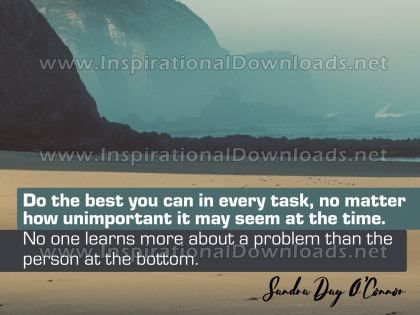Don’t Make a Late-Life Career Change Until You Read This
Changing careers can feel a bit intimidating at any age. That’s especially true when you’re considering making a major transition late in life. Then again, recent trends suggest that your chances for success may be greater than you think.

>> More about this image at Inspirational Posters
A survey by the American Institute for Economic Research found that more than 80% of respondents said they were able to launch a new career after age 45. Even when they had to take an initial pay cut, most of them were able to increase their income over time.
What does that mean for you? Sticking it out until retirement doesn’t have to be your only option when you can do something you love, even if it means making less money temporarily. Plus, with retirement ages increasing, you might be able to benefit from your new career for many more years to come.
Whether you’re a mature adult who wants to pursue your passions, reduce stress, or just enjoy a change of pace, an encore career might be just what you need.
Consider these strategies for preparing for the next stage in your professional life:
Prepare Financially
1. Cut expenses. Most career changes mean a smaller paycheck initially. You’ll feel less pressured if you trim your budget now by eating out less or selling a second car.
2. Pay off debts. For more peace of mind, work towards becoming debt-free. Pay off your most expensive debts first and stop credit card spending as much as possible.
3. Consider moving. Relocating to a less expensive area can have a big impact on your budget. Browse online for destinations that match your lifestyle.
[wpgfxm_contentbox width=”90%” bg_color=”#F1F8FB” b_color=”#C1D2D9″ style=”solid” top=”1px” right=”none” bottom=”1px” left=”none” radius=”0px”]
– by Steve Jobs –
More about this quote at
Inspirational Downloads
[/wpgfxm_contentbox]
4. Share housing. Housing is the biggest expense for most adults. Maybe you can rent a room in your home or share an apartment with a friend.
5. Delay retirement. If you can delay claiming Social Security, you’ll be entitled to bigger checks. Your monthly benefits increase for each year you continue working between ages 62 and 70.
6. Be flexible. Full-time jobs aren’t the only way to work. Consider working part-time or consulting.
Prepare Professionally
1. Research your opportunities. Teachers, registered nurses, and home health aides are among the fastest growing occupations for older workers, according to a recent report by MetLife Foundation. Visit your local library or browse online to find out more about opportunities that interest you.

Ad by www.Faithraiser.net
2. Increase your skills. See what qualifications you’ll need. You may want to take evening classes to complete an additional degree or certification.
3. Strengthen your network. It’s important to keep networking even when you have a job. If you’re feeling rusty, start attending more networking events or invite a former colleague out for lunch.
4. Use social media. LinkedIn and other platforms make it easier than ever to research the job market and connect with others. Update your profiles to reflect your new ambitions. Share information and participate in relevant discussions.
5. Build support. Starting over in a new field will require time and effort. Ask your family and friends for the encouragement and assistance that you need. Team up with another mature professional who’s going through a similar transition or start a Meetup Group.

Ad by www.Faithraiser.net
6. Gain visibility. As you’re trying to rebrand yourself, publishing and public speaking will help you to gain attention. Start your own website or contact other sites to ask if you can become a contributor. Once you have some experience, design an online workshop or give a talk at a local community center.
If you’ve been dreaming about taking your career in a different direction, start preparing now. You may find that the later stages of your professional life will be the most rewarding.
Featured Personal Development Ebook:
In rare cases, self-criticism can be useful. It may increase humbleness and provide a way to evaluate mistakes.
However, most of the time, self-criticism creates unnecessary pain and suffering.
Self-critical thoughts can increase the risk of depression, anxiety, stress, and other mental health issues. They also weaken your self-esteem and confidence.
Luckily, in this guide you will learn to reframe these negative thoughts in your head and overcome them.
You will receive the file/s below (in one ZIP file) for your personal use:
+ MAIN EBOOK: How to Reframe Self Critical Thoughts and Boost Your Self Esteem (33-page PDF)
+ WORKSHEET: How to Reframe Self Critical Thoughts and Boost Your Self Esteem (4-page PDF)
+ BONUSES:
15 Career Milestones to Set and Celebrate (57-page PDF)
4 Meditations Inspired by Canned Soup (3-page PDF)
9 Quick Ways to be More Likable (1-page PDF)





